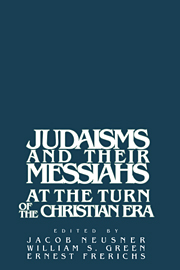Book contents
- Frontmatter
- Contents
- Preface
- List of Contributors
- 1 Introduction: Messiah in Judaism: Rethinking the Question
- 2 Wisdom Makes a Difference: Alternatives to “Messianic” Configurations
- 3 Salvation without and with a Messiah: Developing Beliefs in Writings Ascribed to Enoch
- 4 How the Authors of 1 and 2 Maccabees Treated the “Messianic” Promises
- 5 Messianism in the Maccabean Period
- 6 Waiting for the Messiah: The Spiritual Universe of the Qumran Covenanters
- 7 Philo and Messiah
- 8 Messiah and Gospel
- 9 Christology in Mark's Gospel
- 10 The Question of the Messiah in 4 Ezra
- 11 From Jewish Messianology to Christian Christology: Some Caveats and Perspectives
- 12 Mishnah and Messiah
- General Index
- Index to Biblical and Hermeneutical Texts
7 - Philo and Messiah
Published online by Cambridge University Press: 08 January 2010
- Frontmatter
- Contents
- Preface
- List of Contributors
- 1 Introduction: Messiah in Judaism: Rethinking the Question
- 2 Wisdom Makes a Difference: Alternatives to “Messianic” Configurations
- 3 Salvation without and with a Messiah: Developing Beliefs in Writings Ascribed to Enoch
- 4 How the Authors of 1 and 2 Maccabees Treated the “Messianic” Promises
- 5 Messianism in the Maccabean Period
- 6 Waiting for the Messiah: The Spiritual Universe of the Qumran Covenanters
- 7 Philo and Messiah
- 8 Messiah and Gospel
- 9 Christology in Mark's Gospel
- 10 The Question of the Messiah in 4 Ezra
- 11 From Jewish Messianology to Christian Christology: Some Caveats and Perspectives
- 12 Mishnah and Messiah
- General Index
- Index to Biblical and Hermeneutical Texts
Summary
The categories “Messiah” and “messianic era” or “end-time” are categories that have been much abused in the history of religions. Scholars in many subfields of the history of religions – as different as for example, Biblical Studies and Native American Studies – have used the categories assuming that they are “normative” categories for religious traditions and without much concern for what the terms might imply about their respective historical data. In many cases, we assume that the “Messiah idea” is the central religious idea, basically the same but with superficial differences in historical manifestation, or that the categories are synonymous (when they should remain distinct, e.g., apocalypticism or millenarian movements). Jacob Neusner has challenged us to revise our understanding of these categories in the Judaisms of late antiquity in his study of the “Messiah idea” in the formative canon of the rabbis. He presents his thesis in this way:
Does Judaism present a messianism, and may we therefore speak of the messianic idea or doctrine of Judaism? The answer … is a qualified negative, yielding a flat no. Judaism as we know it contains numerous allusions to a Messiah and references to what he will do. But so far as we examine the original canon of the ancient rabbis, framed over the second through seventh centuries, we find these inherited facts either reformed and reshaped for use in an essentially non-messianic and ahistorical system, or left like rubble after a building has been completed: stones that might have been used, but were not. […]
- Type
- Chapter
- Information
- Judaisms and their Messiahs at the Turn of the Christian Era , pp. 139 - 168Publisher: Cambridge University PressPrint publication year: 1988
- 3
- Cited by



